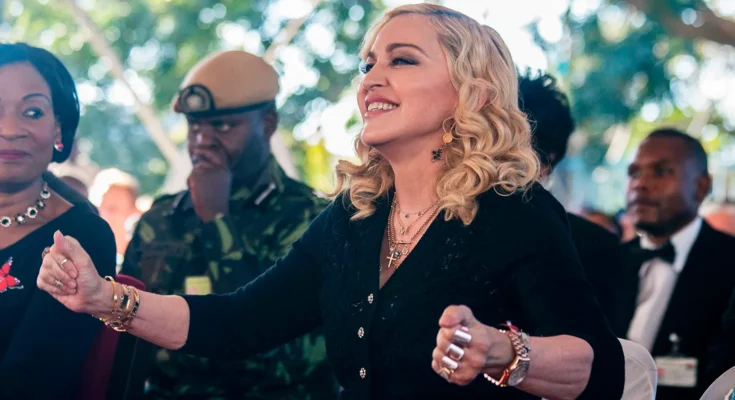Madonna, the Queen of Pop, is known across the globe for her decades-spanning music career, provocative artistry, and bold reinventions. Yet beyond the glitter of her stardom lies a lesser-known but deeply impactful side of her persona — her philanthropic commitment to Africa, particularly to the nation of Malawi. Her efforts over nearly two decades have blended passion, celebrity influence, and humanitarian ambition, leaving an indelible mark on the region. However, her journey has not been without challenges or criticisms, raising important questions about the intersection of celebrity, charity, and local agency.
The Genesis of a Mission: Why Malawi?
Madonna’s philanthropic journey in Africa began in the mid-2000s. After visiting Malawi in 2006, she was deeply moved by the country’s struggles with poverty, orphaned children, and the HIV/AIDS epidemic. Her first trip was not merely a visit; it was a catalyst. The singer adopted her son David Banda from Malawi that same year — an act that sparked both global media attention and significant legal and ethical debate. Nevertheless, this personal connection seemed to ignite a broader mission for Madonna: to help improve the lives of Malawi’s most vulnerable citizens.
Raising Malawi: Building a Foundation for Change
In 2006, Madonna co-founded the non-profit organization Raising Malawi with Michael Berg, a Kabbalah teacher and humanitarian. The organization aimed to address the extreme poverty and hardship facing orphans and vulnerable children in Malawi. Its mission was rooted in providing access to education, healthcare, and community support.
One of the earliest and most ambitious goals of Raising Malawi was the construction of a girls’ school outside the capital city, Lilongwe. Modeled after Oprah Winfrey’s school in South Africa, the “Raising Malawi Academy for Girls” was intended to offer world-class education and empower a new generation of Malawian women. However, the project was marred by allegations of mismanagement, lack of clear planning, and internal strife. In 2011, the project was officially abandoned, and the foundation was restructured.
A New Direction: Infrastructure and Medical Aid
Despite the early setback, Madonna did not abandon her philanthropic goals. Instead, she pivoted to supporting existing infrastructure and working more closely with local organizations and government agencies. Under the restructured Raising Malawi, the focus shifted from building new institutions to enhancing existing ones.
One of the most impactful initiatives came in partnership with Mercy James Pediatric Surgery Hospital — the first of its kind in Malawi. Named after Madonna’s adopted daughter Mercy James, the hospital opened in 2017 and serves as a critical facility for pediatric surgery and intensive care. The hospital, built in collaboration with Malawi’s Ministry of Health, was a monumental achievement. It represented a shift in strategy: working with — rather than independently of — local systems.
The facility not only provides medical care to thousands of children each year but also trains local doctors and nurses. Madonna’s foundation has supported it with equipment, personnel training, and ongoing operational support. This initiative was widely praised and marked a significant turnaround from her earlier, more controversial philanthropic approaches.
Beyond Bricks and Mortar: Cultural and Social Investment
Madonna’s philanthropy in Africa has not been limited to physical infrastructure. She has also focused on cultural and social development. Raising Malawi has provided scholarships to underprivileged children, funded orphan care, and supported HIV/AIDS education and prevention initiatives. The foundation has also engaged in food security and clean water programs, acknowledging the complex web of challenges that affect child welfare and community health in Malawi.
Madonna has used her celebrity status to draw international attention to the needs of Malawi, hosting fundraisers, auctioning personal items, and encouraging her fans to donate. She also produced the documentary I Am Because We Are (2008), which explores the lives of children orphaned by AIDS in Malawi. Narrated by Madonna herself, the film was a poignant reminder of the human stories behind the statistics and helped raise global awareness about the crisis.
Criticisms and Controversies
While her intentions have largely been seen as genuine, Madonna’s philanthropic work has not been free from criticism. Her adoptions from Malawi — four children in total — sparked fierce debate about international adoption, ethical boundaries, and cultural sensitivity. Critics accused her of leveraging her celebrity status to bypass normal legal procedures, though she maintained that she followed all required protocols and acted in the children’s best interest.
Her initial attempts at launching large-scale projects independently were also criticized as being out of touch with local needs and realities. Accusations of top-down planning and insufficient engagement with Malawian stakeholders led to questions about the effectiveness of celebrity-led charity work. In 2013, Malawi’s former President Joyce Banda publicly accused Madonna of exaggerating her contributions and seeking VIP treatment, sparking a very public dispute. The incident highlighted the fragile dynamics that can exist between foreign donors and host governments.
A Lasting Impact
Despite these setbacks, Madonna’s persistence and adaptability have led to meaningful change. Over the years, she has demonstrated a willingness to learn, recalibrate, and commit long-term to a cause many celebrities only touch briefly. The Mercy James Center is a functioning, impactful institution. Scholarships have helped real students achieve their goals. Healthcare access has improved. And the visibility Madonna brings to Malawi’s challenges continues to attract international attention and support.
Moreover, by including her children — all of whom have visited Malawi and been involved in charity work — Madonna is helping foster a new generation of socially conscious individuals. Her example, despite its flaws, continues to inspire discussion about how the powerful and privileged can responsibly contribute to global humanitarian efforts.
Conclusion
Madonna’s philanthropic work in Africa is a multifaceted story of hope, ambition, missteps, and redemption. It is emblematic of the complex interplay between celebrity influence and global development. While her early efforts were met with skepticism and misjudgments, her enduring commitment to Malawi has evolved into a more grounded and effective form of humanitarianism. Through Raising Malawi, the Mercy James Institute, and countless other initiatives, Madonna has shown that philanthropy — like art — can be transformative, but only when it listens, learns, and collaborates.
In the grand narrative of her legacy, Madonna’s work in Africa stands as a bold, if imperfect, testament to the power of using fame for good.



